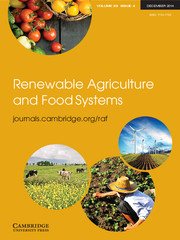Article contents
Pesticide Free Production: Characteristics of farms and farmers participating in a pesticide use reduction pilot project in Manitoba, Canada
Published online by Cambridge University Press: 12 February 2007
Abstract
Strategies for pesticide use reduction have suffered from limited adoption. The impact of such strategies will be greater if they appeal to farmers with typical demographics and attitudes. A participatory, on-farm study was conducted to assess the potential of Pesticide Free ProductionTM (PFP) [Pesticide Free ProductionTM and PFPTM are registered trademarks of the University of Manitoba.] to be widely implemented on mainstream farms in Manitoba, Canada. PFP is a flexible, simple framework intended to appeal broadly to farmers who may not have adopted other pesticide use reduction initiatives. It may also provide a marketable food product label. This novel crop production system prohibits the use of in-crop pesticides and seed treatments during one crop year, as well as prior use of residual pesticides. Applications of nonresidual pesticides (such as glyphosate) are permitted prior to crop emergence. Synthetic fertilizer use is permitted at any time. The objectives of this study were: (1) to determine if the demographic and attitudinal characteristics of farms and farmers participating in a PFP pilot project varied depending on the level of PFP implementation; and (2) to compare the characteristics of farms and farmers participating in the pilot project with standards representing average farms and farmers in Manitoba. A total of 71 farmers, representing 120 fields and 11 crops, participated in the study. Fields and farmers were categorized into three groups, based on whether or not fields: (1) achieved PFP certification status and (2) were in transition to organic production. There were few demographic differences among groups. Demographic characteristics of participating farmers were typical for Manitoba, with the exception that participating farmers who were not in transition to organic production had higher levels of education than a random sample of Manitoba farmers. Attitudinal orientation (adherence to a conventional versus an alternative agricultural paradigm) of participants who were not in transition to organic production was similar to that of a random sample of Manitoba farmers. Fields and farms on which PFP was implemented were relatively large in the context of Manitoba averages. Participants indicated high satisfaction with certifiable PFP crops and high levels of interest in implementing future PFP. Pesticide free production demonstrates significant potential for broad adoption in this region.
Keywords
- Type
- Research Article
- Information
- Copyright
- Copyright © Cambridge University Press 2004
References
- 7
- Cited by


